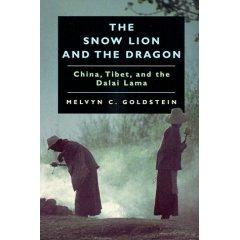| | The Snow Lion And The Dragon: China, Tibet, And The Dalai Lamaby Melvyn C. Goldstein 
Download Book
(Respecting the intellectual property of others is utmost important to us, we make every effort to make sure we only link to legitimate sites, such as those sites owned by authors and publishers. If you have any questions about these links, please contact us.)
link 1
About Book
Amazon.com
Just the facts, Ma'am. Wouldn't it be nice if we could simply inspect the historical record and resolve the question of whether or not Tibet has traditionally been a part of China? Melvyn Goldstein, anthropologist and Tibet specialist, takes us in that direction in The Snow Lion and the Dragon. The results? Not so fast. Like a scientist analyzing experimental data, Goldstein walks us through centuries of unending political struggle and battles of conquest. He shows us that Tibet first came under Chinese suzerainty during the Mongolian era and then for almost 300 years during the Manchu era. For the most part, The Snow Lion and the Dragon succeeds as chronicle of the power plays of two governments vying for control of Tibet. But when Goldstein speaks of the Chinese government, what does he mean by "Chinese"? Does he mean the Mongols when they controlled the territory we call China and the Manchus when they did? Were these legitimate Chinese governments? Although Goldstein is sincere in his objective methods, many questions such as these lurk behind the illusion objectivity. Ultimately, history is interpretation, and without admitting this, Goldstein lures the reader into a false sense of complacency. The Snow Lion and the Dragon is a helpful historical summary for anyone who wonders how the Tibet Question has played itself out from the beginning up until 1997, but for an adequate examination of historical subtleties surrounding the issue, we must continue to wait. --Brian Bruya
Pico Iyer, New York Review of Books
"A rigorously unsentimental account."
Book Description
Tensions over the "Tibet Question"--the political status of Tibet--are escalating every day. The Dalai Lama has gained broad international sympathy in his appeals for autonomy from China, yet the Chinese government maintains a hard-line position against it. What is the history of the conflict? Can the two sides come to an acceptable compromise? In this thoughtful analysis, distinguished professor and longtime Tibet analyst Melvyn C. Goldstein presents a balanced and accessible view of the conflict and a proposal for the future.
Tibet's political fortunes have undergone numerous vicissitudes since the fifth Dalai Lama first ascended to political power in Tibet in 1642. In this century, a forty-year period of de facto independence following the fall of the Qing dynasty in 1911 ended abruptly when the Chinese Communists forcibly incorporated Tibet into their new state and began the series of changes that destroyed much of Tibet's traditional social, cultural, and economic system. After the death of Mao in 1976, the rise to power of Deng Xiaoping quickly produced a change in attitude in Beijing and a major initiative to negotiate with the Dalai Lama to solve the conflict. This failed. With the death of Deng Xiaoping, the future of Tibet is more uncertain than ever, and Goldstein argues that the conflict could easily erupt into violence.
Drawing upon his deep knowledge of the Tibetan culture and people, Goldstein takes us through the history of Tibet, concentrating on the political and cultural negotiations over the status of Tibet from the turn of the century to the present. He describes the role of Tibet in Chinese politics, the feeble and conflicting responses of foreign governments, overtures and rebuffs on both sides, and the nationalistic emotions that are inextricably entwined in the political debate. Ultimately, he presents a plan for a reasoned compromise, identifying key aspects of the conflict and appealing to the United States to play an active diplomatic role. Clearly written and carefully argued, this book will become the definitive source for anyone seeking an understanding of the Tibet Question during this dangerous turning point in its turbulent history.
From the Inside Flap
"A marvelously informative and realistic look at both how China and Tibet reached their present impasse and how their differences might yet be peacefully resolved. By providing much crucial background material about this fractious problem, it becomes essential reading for anyone who cares about Tibet's future."--Orville Schell, author of Mandate of Heaven
"Mel Goldstein has dedicated his life to the study of Tibet. In his latest book, he offers the most concise summary yet available of the roots of the crisis in Tibet. Regardless of one's point of view, this book should be read by anyone concerned with China, China's relations with the West, and the endangered people of Tibet."--Ambassador Richard C. Holbrooke, former Assistant Secretary of State for East Asian and Pacific Affairs
From the Back Cover
"A marvelously informative and realistic look at both how China and Tibet reached their present impasse and how their differences might yet be peacefully resolved. By providing much crucial background material about this fractious problem, it becomes essential reading for anyone who cares about Tibet's future." (Orville Schell, author of Mandate of Heaven)
About the Author
Melvyn C. Goldstein is John Reynolds Harkness Professor and Chair of the Department of Anthropology at Case Western Reserve University as well as Director of the University's Center for Research on Tibet. He is author or coauthor of over eighty articles and books on Tibet, including A History of Modern Tibet, 1913-1951 (California, 1989), Essentials of Modern Literary Tibetan: A Reading Course and Reference Grammar (California, 1991), and The Struggle for Modern Tibet: The Autobiography of Tashi Tsering (1997). Related Free eBooks | Related Tags |













SEND A COMMENT
PLEASE READ: All comments must be approved before appearing in the thread; time and space constraints prevent all comments from appearing. We will only approve comments that are directly related to the article, use appropriate language and are not attacking the comments of others.